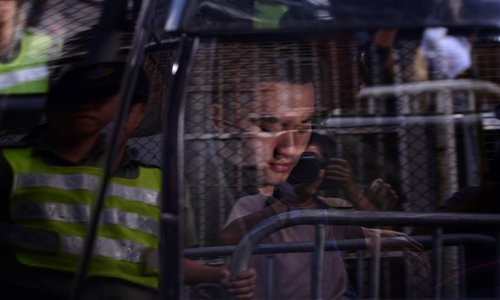HOME >> OPINION
DPP eyes political gains from murder case
Source:Global Times Published: 2019/10/23 22:38:40

Chan Tong-kai, the suspect of a homicide case in China's Taiwan, was released from jail in Hong Kong, South China, on October 23, after serving prison term for money laundering. Photo: IC
Chan Tong-kai was released from prison Wednesday. He apologized for killing his girlfriend and reiterated his willingness to go to Taiwan to surrender. Just before he was discharged, the Taiwan authorities who had publicly refused to accept him suddenly changed their stance and announced that they would send their law enforcement officers to the Hong Kong Special Administrative Region (SAR) to escort Chan to the island of Taiwan for trial.
However, since the Taiwan law enforcement agents have no right to enforce law in Hong Kong, the Hong Kong SAR government rejected its request. It was a murder case based on clear evidence, but has become complicated. Although Chan has been wanted in Taiwan and the suspect is willing to surrender, he cannot be tried in Taiwan. It is absurd.
Too many political elements are involved in this case. The Hong Kong SAR government proposed the extradition bill following this murder case, but the incident was turned into a bigger movement by the Hong Kong opposition, severely deviating from the original intention. Now, there is even no suitable place to put Chan on trial.
Between the Hong Kong and Taiwan governments, which side is the one politicizing the case? The answer is clear from which side is benefiting from causing political turbulence since the start of the anti-extradition bill movement. Hong Kong suffered a series of political consequences from the fallout of Chan's case, while Taiwan's Democratic Progressive Party (DPP) authority has gained politically.
How Chan's case will proceed may not help the Hong Kong government cope with the current situation, but how to expand the positive factors from Chan's case would be a "major decision" for the DPP as next year's election is approaching.
Chan would be a free man in Hong Kong after being released from prison, but he is willing to surrender in Taiwan. Therefore, the case will return to Taiwan's jurisdiction if Taiwan prosecutors arrest him at the airport. The first reaction of the Taiwan authorities, however, was that they could not receive Chan, claiming that his surrender was manipulated.
The Tsai Ing-wen authorities later completely reversed their decision, throwing out a plan to dispatch Taiwan's law enforcement officers to Hong Kong to arrest and escort Chan back.
Nevertheless, it would not be hard to see that this is another trick being played by the Taiwan government, which is scheming to claim its "sovereignty" by carrying out law enforcement in Hong Kong.
Even Chinese mainland police face legal obstacles related to Hong Kong's high degree of autonomy if they want to detain fugitives in Hong Kong and bring them to the mainland for trial. How could Taiwan law enforcement agents have no legal problems when they want to go to Hong Kong to enforce the law and take suspects away?
The Hong Kong government promoted the extradition bill to establish a legal framework and resolve the institutional obstacles to the extradition of fugitives. Unfortunately, the bill ended up causing widespread turmoil in Hong Kong.
In the process, the Taiwan authorities have not only aggravated the "anti-extradition bill" movement, but have taken advantage of the incident for winning more votes for Tsai and DPP that adopt a radical political line.
Will Chan finally be able to surrender in Taiwan? It depends to what extent Taiwan's public opinion has been kidnapped by the Tsai authorities. Whether justice or politics wins remains to be seen.
RELATED ARTICLES:
Posted in: EDITORIAL